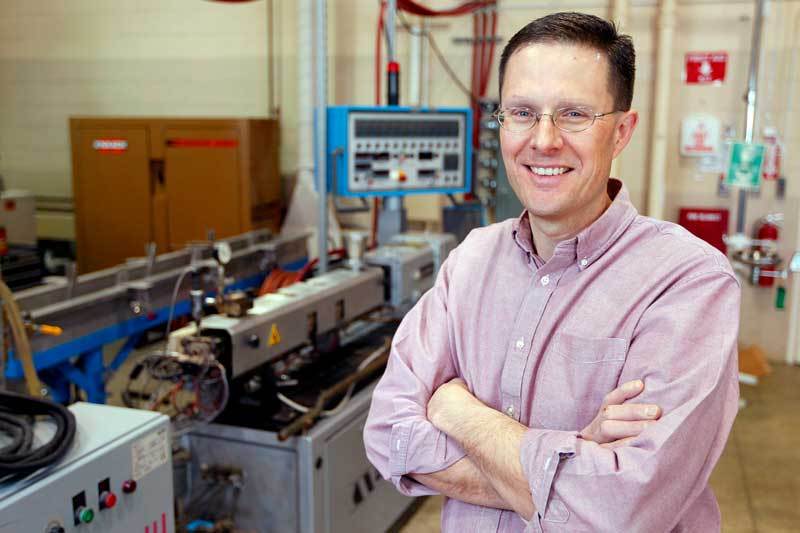Instructor and Innovator



PHOTO: BBI INTERNATIONAL
August 23, 2021
BY Matt Thompson
“I’ve got to admit, I’m always excited about distillers grains,” says Kurt Rosentrater, this year’s recipient of the International Fuel Ethanol Workshop & Expo’s 2021 Award of Excellence. “It’s never a dull moment. The industry continues to evolve, and it always has.”
The Award of Excellence is given to individuals who have helped the ethanol industry through research, development or technical advisory. As an associate professor at Iowa State University and the executive director of the Distillers Grains Technology Council, Rosentrater holds down the dual roles of researcher and market developer.
One of the more exciting aspects of his career has been watching it evolve, he says. “In particular, we see coproducts evolving. Not just distillers grains anymore, but specific designer protein feeds, for example,” he says, adding that designer fiber feeds and yeast are also becoming important for animal nutritionists and the feed industry. “What I’ve seen over the last decade is a movement towards biorefining—not on the alcohol or chemical side, but biorefining in terms of capturing and using nutrients from the grain itself, and that’s really exciting.”
Rosentrater began his career after graduating from Iowa State University where he studied agricultural engineering. “It was a confluence of grain and science and math, and I found my calling,” Rosentrater says. After graduating, he joined an engineering firm while he worked toward his graduate degree.
He then took a position at the U.S. Department of Agriculture, where he “was spearheading their distillers grains research program because, at the time, the industry was just getting ready to really start to grow,” Rosentrater says. “This was back in the early 2000s. It was really a great opportunity to help the industry.”
The early efforts, followed by two decades of continuous work to grow the industry, were recognized by Rosentrater’s peers and the industry at large in July. More than a dozen letters of recommendation were submitted in support of Rosentrater receiving the Award of Excellence. “That is quite something. It truly is a humbling feeling,” he says. “You go to work, you try to help the industry, but to be recognized for your work … It's a fantastic feeling.”
Rosentrater has been a professor at Iowa State University in the Department of Agriculture and Biosystems Engineering for the last decade where, in addition to distillers grains research, he also teaches. But it was his dedication to research that his colleagues recognized in nominating Rosentrater.
Charles Abbas, CTO of ibiocat Inc., says Rosentrater’s background allows him to take an approach to research that helps the industry solve relevant problems. “For almost 20 years, his research program at several universities has focused on overcoming challenges and improving utilization for alcohol fermentation feed coproducts,” Abbas says. “Specifically, he has been working on ways to improve the physical nature, material handling characteristics, and storage of coproducts; and develop new market opportunities for coproducts.”
Lance Forster, manager of global animal safety at ADM agrees. He says he appreciates Rosentrater’s “dedication to the science as well as to the application of his results to industry and commercial applications.
While the industry’s evolution has been exciting to see, Rosentrater says there is still work to be done, especially as it relates to new feed ingredients. “As the industry continues to evolve, there’s still a lot of things that have to be done in terms of educating livestock nutritionists, educating livestock producers on what are these feed products that are coming out of the ethanol industry,” he says, adding that the education needs to focus not just on what these new products are, but how best to utilize them.
That’s especially important as distillers grains find their way to new industries like aquaculture and pet food, he says. “There’s a lot of work to do in terms of educating the pet nutritionists and the fish nutritionists about not just, can you use these products, but how do you effectively use these and how do you optimize your feed strategy by using these ingredients,” Rosentrater says.
That education is part of the mission of the Distillers Grains Technology Council, which focuses on improving the quality of distillers grains, as well as education and communication about the value of DDGS. Rosentrater has served as CEO and executive director of the organization since 2013, when Charlie Staff retired.
Rosentrater’s efforts at the DGTC are also appreciated by his colleagues. “Via the Distillers Grains Technology Council, [Rosentrater] has been able to synthesize information to be presented to industry players so that they may foresee future challenges,” says Reece Cannady, manager of global trade for the U.S. Grains Council.
Reflecting on his career, Rosentrater says he enjoys seeing ethanol plants focusing on the quality of the feed ingredients they produce. In the early days, as production ramped up, the challenge was dealing with an abundance of distillers grains. “I think it’s really interesting to see not just quantity, but now quality,” Rosentrater says. “I think that’s the really great thing, the quality. You see ethanol plants looking to improve their distillers grains quality.”
And that quality has led to growing markets for DDGS. “We are seeing the industry acknowledge that the feed products we manufacture make a big difference, not just to the ethanol industry, but to the U.S. agriculture industry,” Rosentrater says. “Because distillers grains, wet and dry, are the no. 1 feed ingredient in the U.S.”
That growth and innovation excites Rosentrater. “The industry is moving forward, and I think that’s really exciting,” he says.
Author: Matt Thompson
Questions: editor@bbiinternational.com
Advertisement
Advertisement
Advertisement
Advertisement
Related Stories
The U.S. Energy Information Administration maintained its forecast for 2025 and 2026 biodiesel, renewable diesel and sustainable aviation fuel (SAF) production in its latest Short-Term Energy Outlook, released July 8.
XCF Global Inc. on July 10 shared its strategic plan to invest close to $1 billion in developing a network of SAF production facilities, expanding its U.S. footprint, and advancing its international growth strategy.
U.S. fuel ethanol capacity fell slightly in April, while biodiesel and renewable diesel capacity held steady, according to data released by the U.S. EIA on June 30. Feedstock consumption was down when compared to the previous month.
XCF Global Inc. on July 8 provided a production update on its flagship New Rise Reno facility, underscoring that the plant has successfully produced SAF, renewable diesel, and renewable naphtha during its initial ramp-up.
The USDA’s Risk Management Agency is implementing multiple changes to the Camelina pilot insurance program for the 2026 and succeeding crop years. The changes will expand coverage options and provide greater flexibility for producers.
Upcoming Events










